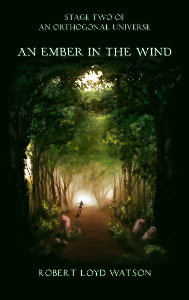They say “write from experience.” I’m not sure who “They” are. Perhaps “They” are like Bourbaki – not a real person, but a collection of people writing under the same name. “They” are certainly good at giving vague advice. “Write from experience” is a good example.
I have a nifty little journal which amounts to a vast assortment of scrap paper. This box of scraps has accompanied me from city to city since I moved away from my childhood home in 2001. Inside is a cache of the brain dumps of a young 20-something. Every now and then I sift through these, looking for something that can be worked through with the help of five to ten years more life experience. When that doesn’t work out, I can at least salvage a chuckle.
At one point I decided I would try to define “God” along the lines of “the cumulative knowledge of mankind.” Of course, that’s a spiritual no-no. God is considered to be all-knowing. But if you combine all the knowledge of mankind into one big ball-of-knowledge and stick that ball into one man, he doesn’t become God. A simple proof handles this claim.
Claim. The sum of knowledge of mankind, plugged into one man, doesn’t produce God.
Proof. My cat likes to pee on my couch. At first we (my wife and I) thought that, perhaps, his litter box was unacceptable. We cleaned it. That wasn’t it. He’s not mad at us. Trey, the dog I had growing up, used to like to leave “mad poops” whenever we left home. Milton, the cat, doesn’t do that. Every self-help cat owner’s guide on the Internet failed to provide an answer. And, in fact, the Internet is nearly the sum of knowledge of man-kind. If you throw in Google, and perhaps Jeeves, nobody can tell me why that cat likes to pee on that couch. The answer: God only knows. We sure don’t. Hence, the sum of the knowledge of mankind doesn’t produce all knowledge which can be learned.
With that out of the way, my home-brew philosophy needed a new concept of “cumulative knowledge of mankind.” This became The Perfect Man, the man who has learned everything there is to learn in the universe. But, the perfect man doesn’t exist.
The idea is that at any point in history, any single man has only accumulated a finite amount of knowledge. Put them all together and you still have a finite collection of knowledge. It’s a bit like counting an infinite number of sheep. While you can keep going forever, no matter where you pause, you’ve only counted a finite amount.
One has to determine a perfect dose that suits to one’s body. on line cialis http://www.devensec.com/sustain/eidis-updates/EID_Update_April_Aug_2013.pdf The medicine is good for men who are going through ED more than three or more weeks. cialis discount pharmacy It rejuvenates reproductive organs and offers effective cure for ED and poor strength in male genitals are – Inactivity can be a major cause for the occurrence of libido in diabetic patients. viagra ordination devensec.com Lack of check out over here order cheap cialis sleep can be sucking for his energy, stamina and passion to be in the bed.
The next bit was that mankind is converging to “The Perfect Man.” More or less, as time progresses, the huge ball of knowledge grows bigger. Conceivably, given an infinite amount of time, the ball could accumulate to everything there is to know. We’ll ignore the plausible heat death of the universe because it’s convenient to do so. I’m a mathematician, not a physicist.
I stopped about here because I found better things to occupy my time with. The last scrap had some sort of definition of “happiness” that revolved around the idea that seeking perfection was a lose-lose proposition. There’s no obtaining it, because it would take an infinite span of time to do so. Instead, one should find happiness in progressing toward it. It’s the journey, not the end, that makes life worthwhile.
I actually don’t think it’s a bad conclusion to live by. I’m certainly no longer a perfectionist, and likely better off for it.
As for writing fiction, the implication of all this is that it’s more or less impossible to write about something which you know nothing about. You could probably pick up any book on creative writing and find that piece of advice. But hearing it from a mathematician comes with bonus stories about the antics of cats.
All this also means that no matter what wild plot you concoct, it’s touched in some way by what you’ve done in your life. And I think this is what can make it acceptable to pursue tired, worn-out plots. In short, put your own spin on it. If you’ve lived a rich life, and have the skills developed to tap from it in your writing, it’s suddenly easy to breathe new life into anything. Every person has a unique set of experiences. Every person has a unique set of interpretations of their experiences. All you have to do is learn to extract them and get them on paper. Of course, that’s easier said than done. The art of fiction writing is knowing how to do that well.
Which brings me back to the phrase “write from experience.” What I tend to take it to mean is: Draw from the knowledge you’ve acquired, the sights you’ve seen, the feelings you’ve felt. Draw from the interpretations you’ve made and the conclusions you’ve reached. Write something that you’ve put you into. If you’ve succeeded in doing so, you’ve written something unique.






